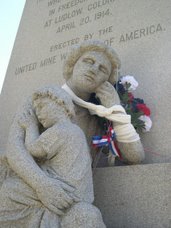Since before the war in Iraq, there have been a number of us older veterans who warned about the problems troops coming home would encounter. The human cost of war was as inevitable as the war itself.
Some of us tried early on to present the issues to peace groups, community members and others to prepare for what was bound to happen. The thinking was prevention might be better than crisis intervention.
I don't think we succeeded in the attempt for prevention. We heard a lot of people express limited interest but when push came to shove the yellow ribbons on cars and the use of veterans to speak out against the war were about the most that ever happened. All the efforts to raise public awareness were mostly lost on the general public.
I apologize if this sounds harsh but for the past four years I've been part of a group of veterans dedicated in tracking the problems of returned troops. The list of violence and destructive behaviors by troops who have been in combat grows ever larger and more families are destroyed.
Unlike Vietnam, this is a war fought by young men and women who "volunteered" and most Americans feel they're not affected by what happens to the troops. I've heard Marines say they fight for their lives while America shops at the mall. Being a former Marine, I know the deep seated sarcasm of what they say. And agree with them.
Of course Americans are affected by the wars in Iraq and Afghanistan. The money spent on these wars is drained from every part of America except the rich and the profiteers aligned with the rich. Schools, healthcare, housing, treatment for substance abuse, treatment for mental illnesses, living wages, job creation, justice and all facets of the American social fabric are touched by the wars.
What's overlooked; however, are the young men and women who went to the killing fields. They aren't the problem. They're the symptoms. Since there's no draft it's become pretty damn easy to overlook men and women who volunteer for military service but little understanding why they join. The poverty draft and the lure of college funding made many of the troops a prime target for recruiters. Fear tactics and overt nationalism following September 11, 2001 led many to believe they were protecting "the homeland".
Most Americans only want to hear from the returning troops during events to rally support for the war or during anti-war events to rally opposition. In the elections since 2003, politicians from both sides have used returned veterans as props for their campaigns to demonstrate they "support the troops" more than the opponent.
They don't want to hear about their nightmares, their flashbacks, their cold sweats, the hyper-vigilance, the thoughts of suicide, the murderous thoughts when provoked, the hateful things said to loved ones, the awful things spoken to their children in the moments of unpredictable rage, the overuse of pot, alcohol and other drugs to drown out the images in their head, the depression that immobilizes them, the difficulties keeping a job or the homelessness.
Americans don't like to hear 25% of the prison population is veterans. They don't like to hear 25% of the homeless are veterans. They don't want to hear 1 in 3 Iraq/Afghanistan vets are seeking mental health treatment. They don't want to hear about the wives killed at Fort Campbell or the murders of other soldiers at Fort Bragg. They don't want to hear 30-40% of the inmates in the brig at Camp Pendleton are incarcerated following behaviors that are classic symptoms of PTSD. Instead of punishment they should have been treated.
There is an urgency to end the wars. Veterans know that all too well. There's many things needed to be done to make this a better and truly moral nation. Activists seem to have all the bases covered in pointing out what needs to be done except the care of the returned troops.
Veterans are welcome to tell their horror stories of combat and atrocity in the peace movement but the story of the war they face in returning to "the world" is too often seen as secondary or whining. The question of their futures is seldom asked or thought about. Where will the vet with amputated legs get the help needed to live as normal a life as possible? Where will the vet with untreated PTSD live and work? What will become of them in twenty years?
Some activists are even angry about the role of veterans in the peace movement. They wonder how someone could have volunteered to take part in what is so obviously an immoral war to activists. They dislike the "hero" status that seems to be given to the veteran. They wonder how truly devoted to peace a veteran is when the ambivalence of allegiance to friends still in the war often comes out. Some of the veterans seem to talk and act like they're still in the military. They tell war stories. They seem aloof and detached from the rest of the group.
In some ways this attitude is no different from the military toward a combat vet that wants to become a conscientious objector AFTER they've been in combat. The military believes the vet can't morally object to the war if they've taken part in it. Of course they can! Who better knows the reality and horror of war? Who better knows the immorality of war than the man or woman sent illegally into war?
I don't propose veterans be given hero status. I've never felt my combat experience was in any way heroic. A young Marine sums it up in the CD "Voices From the Front". The CD is a collection of raps, rhymes, songs and discussions by Marines in Iraq that have been in combat. The young Marine says he's asked how many people he killed by friends back home and responds that even if he knew he'd never tell because what he did is between him and God. What he did, he did to survive.
Veterans are survivors not heroes. They can be the verbal historians of the experience of war. Their history can be used to avoid the insane impulses or the calculated madness of wars. They can be powerful voices to challenge politicians who are willing to throw away the lives of the nation's youth. They can resist war and their courage to do so become heroic at times but no more than the dedicated activist who has resisted all along
But the veterans must also find some peace and sanity for themselves. They must get the care needed for the wounds inflicted upon their bodies and minds. They can't be ignored. Their wounds will be healed or fester into an epidemic that will infect the entire nation. America can pay now or pay much more if it waits until later to help them heal.
The peace movement can demonstrate they do support the troops by making the needed care for emotional and physical wounds part of their agenda. They can reach beyond the normal group of activists and come together with families and community members just as concerned. The common ground of caring for the veterans can be used to have conversation and true dialogue with people outside the movement.
The returning troops can be witnesses to the truth about war. Their revelations about war experiences can provide young people vitally important information to make informed decisions if recruiters attempt to lure them into enlistments based on sugar-coated perspectives of the military. The troops can cause Americans to question the rush to war by an administration manipulating data to create fear.
The American soldier is the personification of the American society. A government of the people must decide how much longer we want to keep sending our children to kill the children of other people around the world. We must decide if we will send another generation to the killing fields and like in all the past wars forget them once their bodies and minds have been consumed by the horrors they endured.
The care of the returning men and women from Iraq and Afghanistan is the responsibility of all Americans whether for or against the war. We can pay the costs now or pay it later with much regret and sorrow.
With all that said I'm posting another article to give further evidence of the impending crisis we face in this nation.
Wm. Terry Leichner, RN
Denver VVAW
USMC combat veteran of Vietnam
By ERIK ECKHOLM
Published: November 8, 2007
WASHINGTON, Nov. 7 — More than 400 veterans of the Iraq and Afghanistan wars have turned up homeless, and the Veterans Affairs Department and aid groups say they are bracing for a new surge in homeless veterans in the years ahead.
Joe Williams lives in a homeless shelter in Washington.
Experts who work with veterans say it often takes several years after leaving military service for veterans' accumulating problems to push them into the streets. But some aid workers say the Iraq and Afghanistan veterans appear to be turning up sooner than the Vietnam veterans did.
"We're beginning to see, across the country, the first trickle of this generation of warriors in homeless shelters," said Phil Landis, chairman of Veterans Village of San Diego, a residence and counseling center. "But we anticipate that it's going to be a tsunami."
With more women serving in combat zones, the current wars are already resulting in a higher share of homeless women as well. They have an added risk factor: roughly 40 percent of the hundreds of homeless female veterans of recent wars have said they were sexually assaulted by American soldiers while in the military, officials said.
"Sexual abuse is a risk factor for homelessness," Pete Dougherty, the V.A.'s director of homeless programs, said.
Special traits of the current wars may contribute to homelessness, including high rates of post-traumatic stress disorder, or PTSD, and traumatic brain injury, which can cause unstable behavior and substance abuse, and the long and repeated tours of duty, which can make the reintegration into families and work all the harder.
Frederick Johnson, 37, an Army reservist, slept in abandoned houses shortly after returning to Chester, Pa., from a year in Iraq, where he experienced daily mortar attacks and saw mangled bodies of soldiers and children. He started using crack cocaine and drinking, burning through $6,000 in savings.
"I cut myself off from my family and went from being a pleasant guy to wanting to rip your head off if you looked at me wrong," Mr. Johnson said.
On the street for a year, he finally checked in at a V.A. clinic in Maryland and has struggled with PTSD, depression, and drug and alcohol abuse. The V.A. has provided temporary housing as he starts a new job.
Tracy Jones of the Compass Center, a Seattle agency that has seen a handful of new homeless each month, said she was surprised by "the quickness in which Iraqi Freedom veterans are becoming homeless" compared with the Vietnam era. The availability of meth and crack could lead addicts into rapid downhill spirals, Ms. Jones said.
Poverty and high housing costs also contribute. The National Alliance to End Homelessness in Washington will release a report on Thursday saying that among one million veterans who served after the Sept. 11 attacks, 72,000 are paying more than half their incomes for rent, leaving them highly vulnerable.
Mr. Dougherty of the V.A. said outreach officers, who visit shelters, soup kitchens and parks, had located about 1,500 returnees from Iraq or Afghanistan who seemed at high risk, though many had jobs. More than 400 have entered agency-supported residential programs around the country. No one knows how many others have not made contact with aid agencies.
More than 11 percent of the newly homeless veterans are women, Mr. Dougherty said, compared with 4 percent enrolled in such programs over all.
Veterans have long accounted for a high share of the nation's homeless. Although they make up 11 percent of the adult population, they make up 26 percent of the homeless on any given day, the National Alliance report calculated.
According to the V.A., some 196,000 veterans of all ages were homeless on any given night in 2006. That represents a decline from about 250,000 a decade back, Mr. Dougherty said, as housing and medical programs grew and older veterans died.
The most troubling face of homelessness has been the chronic cases, those who live in the streets or shelters for more than year. Some 44,000 to 64,000 veterans fit that category, according to the National Alliance study.
On Wednesday, the Bush administration announced what it described as "remarkable progress" for the chronic homeless. Alphonso R. Jackson, the secretary of housing and urban development, said a new policy of bringing the long-term homeless directly into housing, backed by supporting services, had put more than 20,000, or about 12 percent, into permanent or transitional homes.
Veterans have been among the beneficiaries, but Mary Cunningham, director of the research institute of the National Alliance and chief author of their report, said the share of supported housing marked for veterans was low.
A collaborative program of the Department of Housing and Urban Development and the V.A. has developed 1,780 such units. The National Alliance said the number needed to grow by 25,000.
Mr. Dougherty described the large and growing efforts the V.A. was making to prevent homelessness including offering two years of free medical care and identifying psychological and substance abuse problems early.
One obstacle is that many veterans wait too long to seek help. "I had that pride thing going on, `I'm a soldier, I should be better than this,'" Mr. Johnson said.
Kent Richardson, 49, who was in the Army from 1976 to 1992 and has flashbacks from the gulf war, said, "when you get out you feel disconnected and alone."
Mr. Richardson said it took him two years to find a job after leaving the Army. Then he became an alcoholic. He now stays at the Southeast Veteran's Service Center in Washington, awaiting permanent subsidized housing.
Joe Williams, 53, spent 16 years in the Army and the Navy, including a deeply upsetting assignment in the mortuary at Dover Air Force Base in Delaware, where the dead from the gulf war were taken for autopsies.
For the past three years Mr. Williams has lived in a bunk bed in a Washington shelter. He was laid off, his car and house were repossessed, and his wife left him. He moved to Georgia, where he lost another job.
Broke and depressed, he walked from Georgia to a V.A. hospital in the Washington area, where schizophrenia was diagnosed. Now, after three years of medication and therapy, he feels ready to start looking for work.
"I have a mission I've got to accomplish," Mr. Williams said.
Sean D. Hamill contributed reporting from Pittsburgh, Michael Parrish from Los Angeles and J. Michael Kennedy from Seattle.
Subscribe to:
Post Comments (Atom)













No comments:
Post a Comment